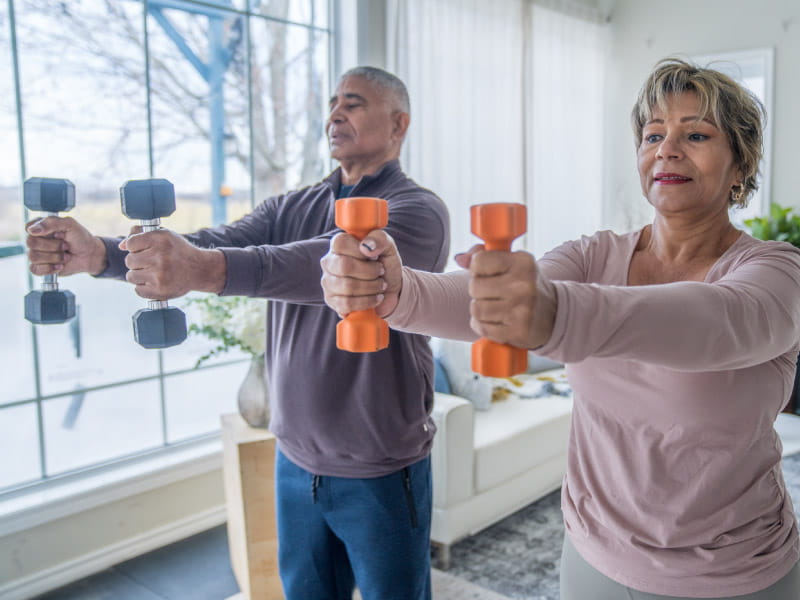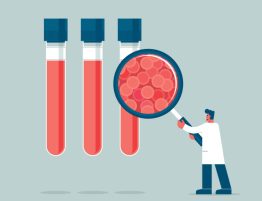
It’s almost a new year, a time when many people resolve to accomplish big things – say, run a marathon or lose 50 pounds – then watch those noble intentions melt away before the winter snow.
Is there a better way to make our resolutions stick?
“What happens to people is they try to boil the ocean,” said Dr. Donald Lloyd-Jones, a cardiologist and chair of the department of preventive medicine at Northwestern University’s Feinberg School of Medicine in Chicago. “They try to fix all their health problems at the same time, and they get discouraged and give up. But even small changes can have a big impact.”
Dr. Riva Rahl, a preventive medicine physician at Cooper Clinic in Dallas, sees the same tendency in her practice.
“People come in with the resolutions and they usually stick to it for like a month,” she said. “I tell them don’t set the bar so high that you’re not going to do it. Find what you can reasonably do to maintain and sustain, and then let’s reconvene and see how it’s working.”
The key word is “incremental,” said Dr. Ahmad Garrett-Price, a family practice physician in Dallas. He emphasizes wellness and healthy lifestyles to his patients.
“I challenge them to pick one or two things you want to change,” he said. “Just making small, incremental changes, trying to be consistent, and then moving on to other things you want to change can do wonders for your health.”
Resolutions to be healthier can be difficult and hard to keep, the experts acknowledge, such as quitting smoking or limiting alcohol consumption. But there are simpler steps to kick off a healthy year that can keep those resolutions from melting away.
“Eat less, eat smart and move more every day is a pretty good formula,” Lloyd-Jones said. “Let’s do what’s achievable and get to that plateau and then shoot for a higher plateau.”
Here are some of their achievable ideas:
Start at the doctor. “If you haven’t been to your doctor recently, that’s a good way to start the new year,” Lloyd-Jones said. “Check your numbers, things like blood pressure, blood sugar and cholesterol, and make a plan for any of the numbers that need attention.”
He also recommends, either with a health care professional or independently, using the American Heart Association’s My Life Check online tool, which uses health and lifestyle data to calculate a heart health score and recommends how to improve it.
Don’t say “exercise.” Just move. “If you’re intimidated by the gym or you don’t have an hour or two to burn there, just do something to be active,” Garrett-Price said. “Just 10 to 15 minutes a day can help keep the heart attack away.”
Rahl noted that in 2018, government health experts updated the Physical Activity Guidelines for Americans to advise that even short periods of activity have cumulative health benefits.
“The bar is now lower,” she said. “Don’t think about it as getting exercise. Think about it as avoiding being sedentary. If you get up and move, that’s powerful. Any physical activity counts.”
That can encompass getting up from your desk periodically and walking around, taking the stairs instead of the elevator, parking farther away from the store, or getting in the habit of a daily walk.
Rahl likes to quote the advice of Dr. Kenneth Cooper, regarded as the father of modern aerobics and founder of Cooper Clinic: “Walk your dog twice a day, whether you have a dog or not.”
Dash to a healthier diet. Bookstores and websites are packed with diet and nutrition advice, but the best eating pattern for heart health is the DASH (Dietary Approaches to Stop Hypertension) diet, according to a recent AHA scientific statement. Generally, that diet is high in non-starchy vegetables, fruits, whole grains and legumes, and it’s low in salt, added sugar, tropical oil, alcohol and processed foods.
The pescetarian, Mediterranean and vegetarian diets also topped the list for heart-healthy eating patterns.
Think fiber. It may not make a lot of New Year’s resolution lists, Rahl said, but boosting dietary fiber does a lot of good.
“It’s been proven to reduce the risk for heart disease,” she said. “It reduces the risk for diabetes, it improves cholesterol, which is another way to reduce your risk for heart disease and stroke, and it’s a significant reduction in the risk for colon cancer.”
And it’s an easy fix. “Just think about increasing whole grains, fruits and vegetables, and beans,” she said. “And if you can’t do it through diet, use a supplement to make up the shortfall.”
But don’t overthink. “We all have stress, but we need to manage it,” Rahl said. “Find one thing that helps you manage stress – whether it’s being with your pet, listening to music, taking a bath, meditating, prayer, decompressing with your loved ones – and find five minutes a day that helps you do that.”
Don’t go it alone. “Find a buddy to help you engage with your health and you’ll be more consistent,” Garrett-Price said. “Do things you enjoy doing, make it fun, and throw in a little activity.”
Resolve not to lose your resolve. “Part of success is understanding there will be peaks and valleys in the journey,” Garrett-Price said. “The biggest thing is to stay encouraged and keep moving forward every day.”






